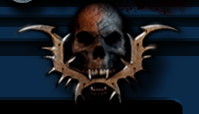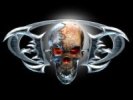This melee system combines elements from systems used in Rune and
the Jedi Knight games. It was designed to use custom melee attack
animations, combined with custom weapons, to give the user a better sense
of melee combat while viewing and playing in the 3rd person mode. It is not
a replacement of either the Rune or the JK system, nor is it perfect. It
is however a
decent system that offers many enhancements to the old melee combat of
ChaosUT.
The
melee system can be broken up into basic parts:
Weapons
- All weapons have bones place in them along the "edge/end" of the
weapon. The code uses these bones to figure out when/what you hit. Bone
placement and size of the weapon will effect the area the weapon can
strike. All of the work of the weapon code is done in the attachment
class. This is were the weapon is drawn and where hits/bock detection
is done. All the main weapon file does is spawn the proper weapon
attachment and attach it to the players hand.
Animations - There were no default player animations in UT2003 for melee combat.
Thus all had to be custom made. The animations will determine where the
weapon is during the swing. We have one handed and two handed animations
as well as special animations (for example dual daggers).
Stances/Attack Style - A player will have 3 basic stances or styles of
attack. Strong, medium and light. Light will be faster attacks doing
less damage. Strong attacks are slower, causing more damage. Medium is in
the middle.
Attacks
- When a player wants to attack they hit their primary fire button.
Then the code looks at the players physics, movement and the player
stance. Then based of those factors it will play a certain animations
and this will be the attack a player launches. For example a Strong
stance, moving forward and jumping in the air would play the massive
over the head, two handed, full downward swing. Vrs a light stance,
backing up where you do a short thrust to keep the other player
away.
Hitting/Damage/Blocking
- Once when code figures out which animation to play (thus your style
of attack) it plays that animation. The players animation moves the
weapon and the weapon attachment since its attached to the players arm.
So were the arm goes, the weapon goes. While its being swung the weapon
also starts to trace between the bones in the weapon attachment model.
All swings last one second and we trace 20 times during that swing or
every .05 second. Thus we have 20 times we could hit possible hit
something. We use a timer to track this to make sure server/client is
synced. That was the light version, let me break it down to the nitty
gritty. Here is what happens during each cycle (remember 20 of them per
swing):
At the start of every cycle (or tracing) the first thing the code does
is look for a block. The code looks at your weapon's bones and then
compares them to any player that is "close". If a player is
close enough, it looks at the player's weapon attachment bones:
If your weapon
attachment bones are
close enough to that players weapon attachment bones, then we say
that's a block, spawn some sparks for visual effect, and the swing
stops with no more cycles/traces. Note you could hit a body during one
cycle then on the next get a block so it is possible to get a block at
anytime during the swing.
If your weapon
attachment bones are not close enough to that players weapon attachment
bones, the swing is not blocked, and it continues to see
if you hit anything else during that check.
In order for a hit to occurr something must cross between the weapon
bones so the trace can find it. Note each weapon has its own bone
location and trace order that optimizes the trace area so not all
weapons are equal (ie the hammer has a different trace pattern that a
sword does). When an object does cross the trace the code then looks to
see what it is.
If its a wall we spawn
a wall hit effect and then stop.
If its a projectile then we call that
projectiles "processtouch" and let the projectile code deal with it.
If
its a player then we give that player damage in that cycle. Note a
player can be hit by again in the next cycle. The code is smart enough
to keep track of what it hits during each cycle of the swing. Only pawns
are allowed to be hit more than once in any swing.
-
Alt Fire - This is set to play a blocking animations much like the
attack. Here since we only have 5 ATM we only really look at movement
and stance. Then all the block animations do is move the weapon. Again
all blocking is done by the other weapon that is attacking you - so the
basic idea here is to get your weapon in their way! If you do, its usually a block.
There are only 5 things I would consider limitations:
Limited moves. As I said before when we attack the code looks at the
players physics, movement and the player stance. We did not look at
every combination as that would give us over 36 possible style of
attacks per weapon!!! We could have that many attacks but we don't due
to lack of animations and complexity. For example the Swords only have
11 unique animations that they play so some combinations give you the
same style of attack. Thus don't expect every attack to be unique. We
can add more once we have the animations.
Animation rates. For some reason we can only play the animation at a
rate of 1.0. Not sure if this is our code or another limiation. but for
now all attacks play at the same rate of 1.0
Blocks are not an exact science. The vector math to do all of the exact
position in a bear so we went with this simpler method. If the code has
a weaker point this is it. The goal is to get the distance the weapon
bones are apart to be close enough that it looks to be a block. I think
we have a good balance. Make the distance any smaller and you get fewer
blocks. Make it any bigger and then you get blocks that don't look to be
close to being real.
Bone placement in the weapons is optimized version. The more bones the
better we can cover a weapon. However the more work we have to do during
each cycle and the worse it impacts our performance. We keep all weapons
to under 6 bones. Swords have 2, single axe has 4, bigger
axe/hammer/mace has 6. This means that part of the weapon model could
impact the player with out it being a hit. However most bones are placed
at the edge so it would be very hard to see this. Most of the time this is a non issue.
Replication. We have to use Epic method of replication of the
animations. Also Epic does not update bone positions on the server so we
do all of the updates at the start of each cycle during the swing. This
is not ideal but something we have to live with. Note we do this for both
blocking and attacking players.
What does this system gives us (advantages)
- Much more control and realism with no randomness. Other methods for
melee just traced out X units in front of you to see if you hit
something. We did the same in CUT. Now we can attack a part of the enemy
that we want to.
- Better blocking. While not ideal it still takes some skill and timing
to get your weapon in a position to block. Other methods were random
(like our old CUT).
- Different levels of attack and attack animations. Two handed over the
head swings, one handed jab, trust, act all based off player controls.
- Different damage during the attack. We have a glancing blow were the
weapon only hits the player once during a swing. Then we could have it
were the weapon hits many times during a swing. Thus we can have a nick
vs. a fatal blow.
- Different weapons add to different styles of fighting.
- Looks and feels cool! Hey it just does!
|










